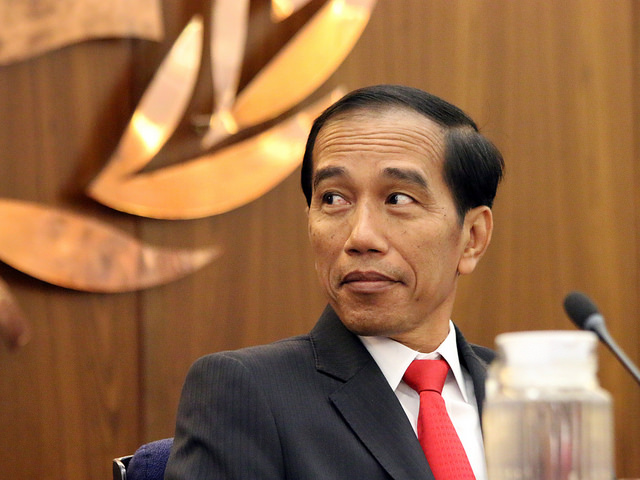
Not given to panic or over-reaction, President Joko Widodo’s decision to postpone his visit to Australia was well justified in the face of the biggest mass demonstration on the streets of Jakarta and other Indonesian cities since the fall of president Suharto 17 years ago.
In hastening to reassure Australian officials that the visit would be re-scheduled, Widodo clearly wanted to also show that the 4 November demonstration by hard-line Islamic groups and its violent aftermath had not thrown him off his stride and there was no danger of it spreading into something bigger.
But as peaceful as most of them were during the 4 November protest, extremist Islamic groups pushing for the prosecution of ethnic-Chinese Jakarta Governor Barsuki “Ahok” Tjahaja Purnama on blasphemy charges are unlikely to stop here if police investigations determine he doesn’t have a case to answer.
In the end, this isn’t just about politics and Purnama’s bid to win a second term in next February’s gubernatorial elections. There’s a much greater issue at stake, which could well determine Indonesia’s future as a pluralistic state.
What persuaded Widodo to scrap his Australian visit was an outbreak of violence in North Jakarta on the evening of the protest, which spooked a Chinese community still mindful of the way it was targeted in riots that preceded president Suharto’s fall from power in 1998.
The blasphemy allegation stems from Purnama’s careless remark last month that Muslim voters shouldn’t allow themselves to be fooled by a Koranic verse supposedly instructing them not to accept non-Muslim leaders.
Like it or not, the verse known as al-Maidah 51 is a stark reminder of the conflict which exists between conservative interpretations of the Koran and the country’s laws, most notably the 1945 Constitution which lies at the foundation of the secular state.
The world’s most populous Muslim nation likes to see itself as a shining example of how Islam and democracy can co-exist, but even mainstream Indonesian Muslims do not necessarily agree with the separation of mosque and state.
Outspoken at the best of times, Purnama should have known better. But a misstep doesn’t explain the strength of the outcry, bringing together not only the Islamic Defenders Front (FPI) and other radical groups, but also powerful political interests determined to kill off his career.
Islamic hardliners have chafed over having an ‘infidel’ in charge of the teeming Indonesian capital ever since Purnama was elevated from his vice-governor position when Widodo, then the incumbent governor, became president in late 2014.
Human rights groups are now calling for a review of the country’s 1965 blasphemy statute, which they say is at odds with a Constitution that guarantees freedom of religion. Rarely employed until Yudhoyono took power, it was used to convict more than 100 people over the next decade.
Activists are also seeking stricter enforcement of an article in the Criminal Code, prescribing five years’ imprisonment for those found guilty of displaying hostility, hatred or contempt towards any group of people, in this case non-Muslims.
Backed by ex-president Megawati Sukarnoputri’s Indonesian Democratic Party for Struggle (PDI-P), Purnama still tops the polls ahead of former education minister, Anies Baswedan, and Agus Yudhoyono, the elder son of former president Susilo Bambang Yudhoyono.
Both of Purnama’s rivals were last-minute entrants in the field, with Baswedan supported by the Sharia-based Justice and Prosperity Party (PKS) and former presidential candidate Prabowo’s Subianto’s Great Indonesia Movement Party (Gerindra). Now that his younger brother has failed to measure up as a politician, Agus Yudhoyono was plucked from a promising military career to represent his father’s Democrat Party in what some analysts believe is an effort to create a political dynasty.
If Purnama is cleared of the blasphemy charge, it will be interesting to see if voters have been influenced by the outcry. In the 2012 gubernatorial elections, Widodo and his running mate won by a landslide, in large part because of efforts to attack them on primordial grounds.
An average of around 12 percent of Indonesians have voted for sharia-based political parties in the four national elections held since the country embarked on the road to democracy after the fall of Suharto in 1998. But there’s a limit. It will still take many more years, if ever, before a non-Muslim becomes president of Indonesia.
The police say they will decide in a fortnight whether Purnama is to be charged, but their cautious approach may have something to do with national police chief Gen Tito Karnavian being a former head of the Detachment 88 counter-terrorism unit. He and other counter-terrorism officers have often criticized the lack of political will in preventing the sort of inflammatory rhetoric from extremist clerics which serves as the ideological underpinnings of terrorist and other violent actions.
Now on more secure political ground, Widodo played his cards well in the lead up to the 4 November demonstration, personally urging the country’s political parties and its two largest Muslim organisations, Nahdlatul Ulama and Muhammadiyah, to prevent the situation from spinning out of control. But in noting that Widodo spent most of that day out of town, critics are worried he may be following the lead of President Yudhoyono, who was widely criticized for allowing extremists to seize the momentum during his decade-long rule.
If he wavers now, in the face of a threatened second rally on 25 November, the constitutional veracity of Pancasila—Indonesia’s state philosophy, and the national rallying cry of Unity in Diversity will both be at risk.

